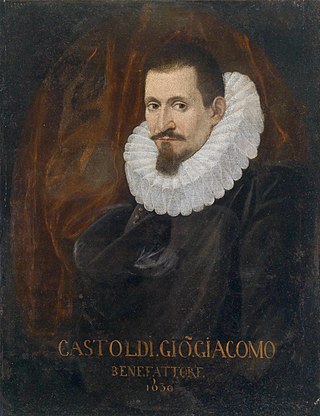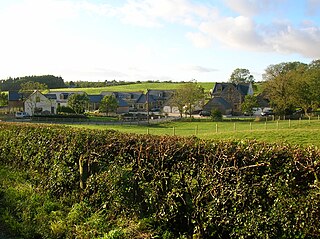
A refrain is the line or lines that are repeated in music or in poetry — the "chorus" of a song. Poetic fixed forms that feature refrains include the villanelle, the virelay, and the sestina.

A madrigal is a form of secular vocal music most typical of the Renaissance and early Baroque (1600–1750) periods, although revisited by some later European composers. The polyphonic madrigal is unaccompanied, and the number of voices varies from two to eight, but usually features three to six voices, whilst the metre of the madrigal varies between two or three tercets, followed by one or two couplets. Unlike the verse-repeating strophic forms sung to the same music, most madrigals are through-composed, featuring different music for each stanza of lyrics, whereby the composer expresses the emotions contained in each line and in single words of the poem being sung.

"Barbara Allen" is a traditional folk song that is popular throughout the English-speaking world and beyond. It tells of how the eponymous character denies a dying man's love, then dies of grief soon after his untimely death.
John Farmer was an important composer of the English Madrigal School. He was born in England during the Elizabethan period, and was also known by his skillful settings for four voices of the old church psalm tunes. His exact date of birth is not known – a 1926 article by Grattan Flood posits a date around 1564 to 1565 based on matriculation records. Farmer was under the patronage of the Earl of Oxford and dedicated his collection of canons and his late madrigal volume to his patron.
The English Madrigal School was the brief but intense flowering of the musical madrigal in England, mostly from 1588 to 1627, along with the composers who produced them. The English madrigals were a cappella, predominantly light in style, and generally began as either copies or direct translations of Italian models. Most were for three to six voices.

Thomas Morley was an English composer, theorist, singer and organist of the Renaissance. He was one of the foremost members of the English Madrigal School. Referring to the strong Italian influence on the English madrigal, The New Grove Dictionary of Music and Musicians states that Morley was "chiefly responsible for grafting the Italian shoot on to the native stock and initiating the curiously brief but brilliant flowering of the madrigal that constitutes one of the most colourful episodes in the history of English music."

Giovanni Giacomo Gastoldi was an Italian composer of the late Renaissance and early Baroque periods. He is known for his 1591 publication of balletti for five voices.
Word painting, also known as tone painting or text painting, is the musical technique of composing music that reflects the literal meaning of a song's lyrics or story elements in programmatic music.
"Fare Thee Well" is an 18th-century English folk ballad, listed as number 422 in the Roud Folk Song Index. In the song, a lover bids farewell before setting off on a journey, and the lyrics include a dialogue between the lovers.
"Deck the Hall” is a traditional Christmas carol. The melody is Welsh, dating back to the sixteenth century, and belongs to a winter carol, "Nos Galan", while the English lyrics, written by the Scottish musician Thomas Oliphant, date to 1862.
The Bonnie Lass o' Fyvie is a Scottish folk song about a thwarted romance between a soldier and a girl. Like many folk songs, the authorship is unattributed, there is no strict version of the lyrics, and it is often referred to by its opening line "There once was a troop o' Irish dragoons". The song is also known by a variety of other names, the most common of them being "Peggy-O", "Fennario", and "The Maid of Fife".
"Riddles Wisely Expounded" is a traditional English song, dating at least to 1450. It is Child Ballad 1 and Roud 161, and exists in several variants. The first known tune was attached to it in 1719. The title "Riddles Wisely Expounded" was given by Francis James Child and seems derived from the seventeenth century broadside version "A Noble Riddle Wisely Expounded".
"Seventeen Come Sunday", also known as "As I Roved Out", is an English folk song which was arranged by Percy Grainger for choir and brass accompaniment in 1912 and used in the first movement of Ralph Vaughan Williams' English Folk Song Suite in 1923. The words were first published between 1838 and 1845.
"The Trees They Grow So High" is a British folk song. The song is known by many titles, including "The Trees They Do Grow High", "Daily Growing", "Long A-Growing" and "Lady Mary Ann".

The Stoned Guest is "the premiere recording of the Half-Act Opera by P. D. Q. Bach", the pseudonym used by Peter Schickele for parodic works. It was released on Vanguard Records in 1970. The title is a play on Dargomyzhsky's opera The Stone Guest. The record is a pseudo-radio broadcast hosted by "Milton Host" including an appearance by "Paul Henry Lung" as a contestant on the intermission game "Opera Whiz" hosted by Schickele.

The Wurst of P. D. Q. Bach is a collection of works by Peter Schickele under his comic pseudonym of P. D. Q. Bach originally recorded on the Vanguard Records label by the composer. It includes "lowlights" from four different Vanguard albums: An Evening with P. D. Q. Bach (1807–1742)?, An Hysteric Return: P.D.Q. Bach at Carnegie Hall, Report from Hoople: P. D. Q. Bach on the Air, and P. D. Q. Bach's half-act opera The Stoned Guest. Wurst is the German word for sausage, with the album cover photograph set in a sausage shop.
"Now is the month of maying" is one of the most famous of the English balletts. It was written by Thomas Morley and published in 1595. It is based on the canzonet So ben mi ch'a bon tempo used by Orazio Vecchi in his 1590 Selva di varia ricreatione. It was printed in Thomas Morley's First Book of Ballets to Five Voyces (1595).

John Hilton was an English early Baroque composer. He is best known for his books Ayres or Fa-Las for Three Voices and Catch That Catch Can.

Thomas Oliphant was a Scottish musician, artist and author whose works were well known in their day. He wrote the chorale for the wedding of the future King Edward VII and Queen Alexandra. Oliphant wrote the words to "Deck the Hall(s) with Boughs of Holly".

Handsome Nell was the first song written by Robert Burns, often treated as a poem, that was first published in the last volume of James Johnson's Scots Musical Museum in 1803 (No.551) with an untitled tune. Burns recorded in holograph on page three of his first Commonplace Book that he wrote the song or Rhyme at the age of only fifteen whilst living at Mount Oliphant Farm, it is regarded as his earliest production, inspired by a farm servant aged fourteen, named either Nelly Kilpatrick or Nelly Blair. Some confusion exists as he also gave his age as 16 in his autobiographical letter to Dr. Moore; the autumn of 1774 is generally accepted.









